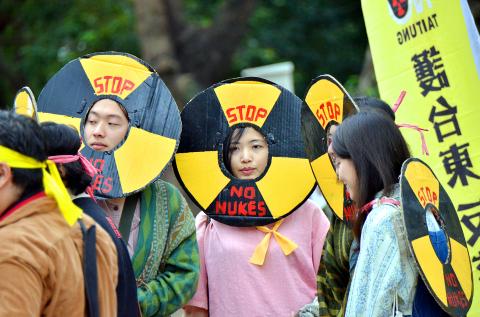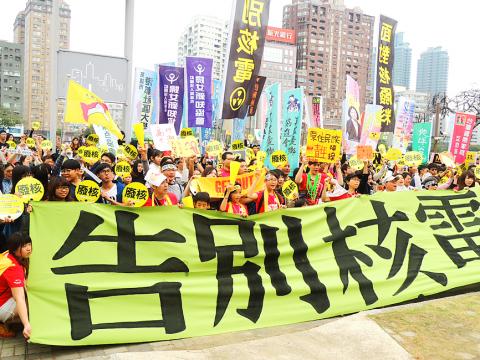An annual parade launched by a coalition of more than 60 groups opposed to nuclear power was held in Taipei yesterday.
Noting the anniversary on Friday of Japan’s Fukushima Dai-ichi nuclear disaster, the National Nuclear Abolition Action Platform said many people in Japan have been forced to move away from their homes due to radioactive contamination, and it does not want a similar situation in Taiwan.
The theme for the parade was “farewell nuclear power and facing nuclear waste,” with activists demanding a nuclear-free nation and a fair solution to nuclear waste disposal.

Photo: CNA
Other anti-nuclear protests were also held across the nation yesterday.
More than a dozen residents living near nuclear power plants in northern Taiwan joined a crowd led by New Power Party Chairman Huang Kuo-chang (黃國昌) to protest in front of the Jinshan Nuclear Power Plant in New Taipei City’s Shihmen District (石門), before moving onto the Guosheng Nuclear Power Plant in New Taipei City’s Wanli District (萬里) and then to the unfinished Fourth Nuclear Power Plant in Gongliao District (貢寮).
Bowing in front of a yellow banner with the names of deceased Taiwanese who had contributed to previous anti-nuclear events, and holding signs that read “30 to 40 years is enough,” “we are fed up with injustice,” and “we do not want to move 500km away from our hometown,” the protesters urged more young people to take a stand against nuclear power.

Photo: Ke Yu-hao, Taipei Times
“Standing up against nuclear power is definitely not something that only us who live in the north should do,” Northern Coast Anti-Nuclear Action Alliance chief executive Kuo Ching-lin (郭慶霖) said. “Are people waiting for the day a nuclear disaster occurs to start standing up against it?”
Meanwhile, Huang said that no one wants nuclear waste stored near their home.
“We need an independent public institution that can discuss the issues of how to dispose or where to place nuclear waste, under objective criteria and through democratic participation,” he said.
Taiwan Power Co (Taipower, 台電) cannot arbitrarily decide where high-level radioactive waste should be stored, he said, adding that nuclear waste disposal is an issue the new government and legislature must face seriously.
Despite the rainy weather, thousands of people, some dressed in costumes and holding handmade signs with anti-nuclear slogans, began gathering on Ketagalan Boulevard in Taipei at about 2pm to join the parade, which set off at 5pm and ended at Taipei’s North Gate (北門) at 6pm.
The platform urged new legislators to respond to their seven demands, including passing a “nuclear-free homeland act” and setting a schedule for nuclear power plant retirement, introducing an energy tax, abolishing the Fourth Nuclear Power Plant, monitoring radioactive contaminated food products and a fair nuclear waste disposal solution.
Attending the parade, Democratic Progressive Party (DPP) Legislator Chen Man-li (陳曼麗) said she is against Taipower’s suggestion to dispose of nuclear waste in other countries, and that the DPP agrees to conduct a comprehensive review on the ideas of an energy tax and standards for monitoring radiation-contaminated food.
A feature of this year’s parade was a 30m-long red banner with “10,000 years of nuclear waste” written on it.
The banner was held by protesters as they paraded through Taipei before they surrounded the North Gate, symbolizing how nuclear waste lasts much longer than any monument in human civilization, so Taiwanese should decide how to deal with it seriously.
The platform said about 7,000 people participated in yesterday’s parade.
President-elect Tsai Ing-wen (蔡英文) of the DPP did not take part in the parade, but she voiced her support on Facebook.
“Having a non-nuclear homeland is an objective that the DPP has insisted on,” Tsai said.
Additional reporting by Loa Iok-sin

INVESTIGATION: The case is the latest instance of a DPP figure being implicated in an espionage network accused of allegedly leaking information to Chinese intelligence Democratic Progressive Party (DPP) member Ho Jen-chieh (何仁傑) was detained and held incommunicado yesterday on suspicion of spying for China during his tenure as assistant to then-minister of foreign affairs Joseph Wu (吳釗燮). The Taipei District Prosecutors’ Office said Ho was implicated during its investigation into alleged spying activities by former Presidential Office consultant Wu Shang-yu (吳尚雨). Prosecutors said there is reason to believe Ho breached the National Security Act (國家安全法) by leaking classified Ministry of Foreign Affairs information to Chinese intelligence. Following interrogation, prosecutors petitioned the Taipei District Court to detain Ho, citing concerns over potential collusion or tampering of evidence. The

NEGOTIATIONS: Taiwan has good relations with Washington and the outlook for the negotiations looks promising, Minister of Economic Affairs J.W. Kuo said Taiwan’s GDP growth this year is expected to decrease by 0.43 to 1.61 percentage points due to the effects of US tariffs, National Development Council (NDC) Minister Paul Liu (劉鏡清) said at a meeting of the legislature’s Economics Committee in Taipei yesterday, citing a preliminary estimate by a private research institution. Taiwan’s economy would be significantly affected by the 32 percent “reciprocal” tariffs slapped by the US, which took effect yesterday, Liu said, adding that GDP growth could fall below 3 percent and potentially even dip below 2 percent to 1.53 percent this year. The council has commissioned another institution

NEGOTIATIONS: The US response to the countermeasures and plans Taiwan presented has been positive, including boosting procurement and investment, the president said Taiwan is included in the first group for trade negotiations with the US, President William Lai (賴清德) said yesterday, as he seeks to shield Taiwanese exporters from a 32 percent tariff. In Washington, US Trade Representative Jamieson Greer said in an interview on Fox News on Thursday that he would speak to his Taiwanese and Israeli counterparts yesterday about tariffs after holding a long discussion with the Vietnamese earlier. US President Donald Trump on Wednesday postponed punishing levies on multiple trade partners, including Taiwan, for three months after trillions of US dollars were wiped off global markets. He has maintained a 10 percent

TRADE: The premier pledged safeguards on ‘Made in Taiwan’ labeling, anti-dumping measures and stricter export controls to strengthen its position in trade talks Products labeled “made in Taiwan” must be genuinely made in Taiwan, Premier Cho Jung-tai (卓榮泰) said yesterday, vowing to enforce strict safeguards against “origin laundering” and initiate anti-dumping investigations to prevent China dumping its products in Taiwan. Cho made the remarks in a discussion session with representatives from industries in Kaohsiung. In response to the US government’s recent announcement of “reciprocal” tariffs on its trading partners, President William Lai (賴清德) and Cho last week began a series of consultations with industry leaders nationwide to gather feedback and address concerns. Taiwanese and US officials held a videoconference on Friday evening to discuss the